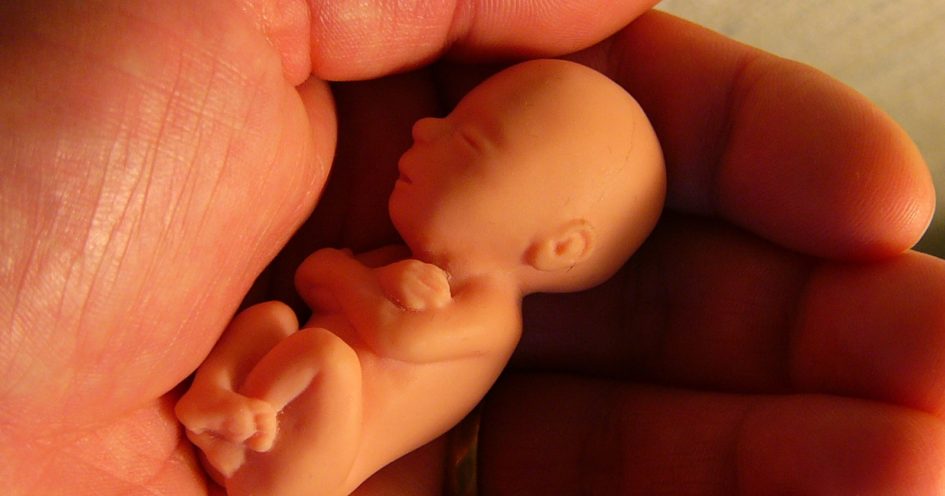At a gathering of liberty-minded young professionals the other night, someone asked if there was a way to unify all libertarians. The joking answer was, “Don’t bring up abortion.” Libertarians—more than any group of people—can find common ground on just about everything, but when it comes to the contentious issue of abortion, it seems that libertarian principles (and conversational civility) go out the window.

There isn’t an issue that divides libertarians more—it’s probably 50-50 by my unscientific estimate—and it’s no wonder. A pro-choicer will say that libertarianism is, naturally, all about liberty, and women don’t have liberty if they’re not allowed to do what they want with their own body. On the flip-side, however, pro-lifers will argue that the body inside of your body isn’t your body. Libertarian principles should apply to the baby just as much as the mother.
What usually follows is a variation of this conversation:
Pro-choicer: right, you shouldn’t force a woman to do something she doesn’t want.
Pro-lifer: But what about the baby?
PC: Well the baby isn’t a human.
PL: Oh no, what species is it?
PC: …. Well, it’s human, but it isn’t living.
PL: If it’s not living, how is it growing, metabolizing?
PC: Well, it’s living, but it depends on the mother for its survival. It’s taking the mother’s lifeblood without her consent, a violation of the mother’s rights.
Most open-minded, intellectually honest people will come to the scientific and logical reality that inside a human mother, her fetus is a living human being. Most people—especially libertarians will see the immorality of killing a living human being.
There is no affidavit that one must sign in order to become libertarian, but I think in order to consider yourself libertarian, you must basically agree with the non-aggression principle (NAP), which is:
The initiation of physical force against persons or property, the threat of such, or fraud upon persons or their property is inherently illegitimate.
Libertarians believe that all humans have the negative right to not be aggressed upon. It’s clear that killing an innocent human being is a violation of the non-aggression principle. But pro-choice libertarians will claim that fetuses are not innocent because they have initiated aggression on their mothers and have thus violated the non-aggression principle. This is the main libertarian argument in favor of reproductive rights and what has led prominent figures in the movement like Walter Block to support the concept of evictionism, based on Murray Rothbard’s stance that, “no being has a right to live, unbidden, as a parasite within or upon some person’s body.” They claim that a woman has the right to expel or evict any fetus from her body whenever she sees fit, just as she could with a parasite, since she has no obligation to care for a trespasser.
It’s probably the best pro-abortion argument I’ve heard but there are flaws.
The non-aggression principle says that it is wrong to initiate force against someone else but there’s a problem when this is applied to a fetus and her mother: the fetus didn’t initiate force. There was no action on the part of the fetus committed that would account for initiation of force. The initiation of force against the mother (if we can stipulate that that’s what it is) occurred between the parents, whether both were consenting or in the case of rape, just one of the parties were consenting. If it was consensual sex, the mother was initiating force against herself and if it was rape, the offending rapist was initiating force against the woman. Either way, it makes no ethical or legal sense to punish an innocent party (the fetus) for someone else’s crime. Killing the fetus or “evicting” her from her life-sustaining environs is illegitimate initiation of force on an innocent person.
Again, while it’s true that no one has a right to live unbidden on someone else’s body, the accused party here (the fetus) is innocent of any wrongdoing and punishing her would be unjust. A hypothetical will help us understand the scenario more clearly. Imagine if some shady character found you sleeping and drugged you to keep you unconscious until he was able to remove your kidneys and surgically connect you to your mother’s renal system. Abruptly removing you from the system would mean sure death to you. Does this scenario mean you don’t have the right to life? It’s not your doing which made you dependent on your mother. Why should you be punished for someone else’s dastardly actions? The only just thing to do is to endure the situation until you can safely be removed from dependence on your mother’s organs and, of course, prosecute the shady mastermind.
But the answers to these objections should be superfluous since the hierarchy of needs requires all logical libertarians to reject abortion. Libertarians believe in the right to liberty, but that right and every other is dependent on the right to life. Without life, there is no liberty. If one doesn’t have a right to continue living, a right to do what he wants is meaningless. That’s why all libertarians should be pro-life.
 The Libertarian Catholic
The Libertarian Catholic
















